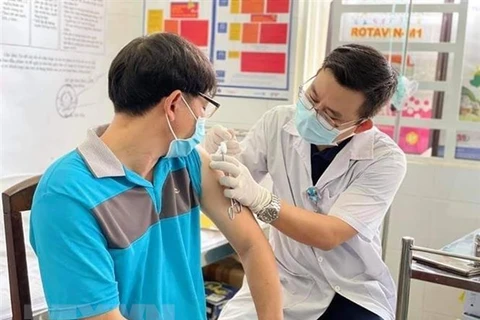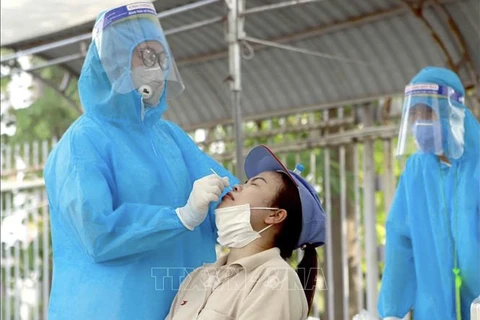Hanoi (VNA) – COVID-19 infections among children and infants is a cause for concern as they have become the group most at risk after the elderly, Malaysia’s Defence Minister Ismail Sabri Yaakob has told a press conference updating coronavirus situation in the country.
So far, 48,261 children and babies nationwide have been infected with the virus, he said, of the number, 6,290 are under the age of 18 months.
UN Children's Emergency Fund (UNICEF) Representative to Malaysia and Special Representative to Brunei Darussalam Dr. Rashed Mustafa Sarwar said the public needs to continue to find new and innovative ways to protect children in this country.
"The future of millions of children depends on the action we take today. Let's come together to keep them safe," said Rashed in his official Twitter account.
Malaysia reported the highest number of daily infections for two days in a row, at 7,478, on May 26. This brought the cumulative total to 533,367, including 2,432 deaths.
Over 2.58 million doses of COVID-19 vaccines have been given to Malaysians so far, with 935,865 people having completed two doses via the National COVID-19 Immunisation Programme.
Cambodia’s Ministry of Health confirmed 660 new COVID-19 cases in the last 24 hours, pushing the national tally to 26,989 on May 26. The new infections, the highest daily number, included 626 local cases and 34 imported.
Seven new fatalities were registered, raising the death toll to 190, the ministry said, adding that another 750 patients recovered.
So far, more than 2.3 million out of the 10 million target population have already been vaccinated in the Southeast Asian country.
In Thailand, the government is modifying its coronavirus immunisation strategy to target worst-hit areas and sectors where clusters are most likely to emerge, as it deals with its most severe outbreak yet and a low vaccination rate.
The strategy prioritises the epicentre Bangkok and nearby provinces, tourism hotspots, construction camps and potential spreaders, like public transport workers, the government’s COVID-19 taskforce said.
Thailand will extend the gap between the first and second doses of AstraZeneca's COVID-19 vaccine to 16 weeks, in an effort to inoculate more people faster.
The country is due to start mass vaccinations next month and of its 66 million people, only 2.5 million have received at least one dose of a coronavirus vaccine./.
So far, 48,261 children and babies nationwide have been infected with the virus, he said, of the number, 6,290 are under the age of 18 months.
UN Children's Emergency Fund (UNICEF) Representative to Malaysia and Special Representative to Brunei Darussalam Dr. Rashed Mustafa Sarwar said the public needs to continue to find new and innovative ways to protect children in this country.
"The future of millions of children depends on the action we take today. Let's come together to keep them safe," said Rashed in his official Twitter account.
Malaysia reported the highest number of daily infections for two days in a row, at 7,478, on May 26. This brought the cumulative total to 533,367, including 2,432 deaths.
Over 2.58 million doses of COVID-19 vaccines have been given to Malaysians so far, with 935,865 people having completed two doses via the National COVID-19 Immunisation Programme.
Cambodia’s Ministry of Health confirmed 660 new COVID-19 cases in the last 24 hours, pushing the national tally to 26,989 on May 26. The new infections, the highest daily number, included 626 local cases and 34 imported.
Seven new fatalities were registered, raising the death toll to 190, the ministry said, adding that another 750 patients recovered.
So far, more than 2.3 million out of the 10 million target population have already been vaccinated in the Southeast Asian country.
In Thailand, the government is modifying its coronavirus immunisation strategy to target worst-hit areas and sectors where clusters are most likely to emerge, as it deals with its most severe outbreak yet and a low vaccination rate.
The strategy prioritises the epicentre Bangkok and nearby provinces, tourism hotspots, construction camps and potential spreaders, like public transport workers, the government’s COVID-19 taskforce said.
Thailand will extend the gap between the first and second doses of AstraZeneca's COVID-19 vaccine to 16 weeks, in an effort to inoculate more people faster.
The country is due to start mass vaccinations next month and of its 66 million people, only 2.5 million have received at least one dose of a coronavirus vaccine./.
VNA
























